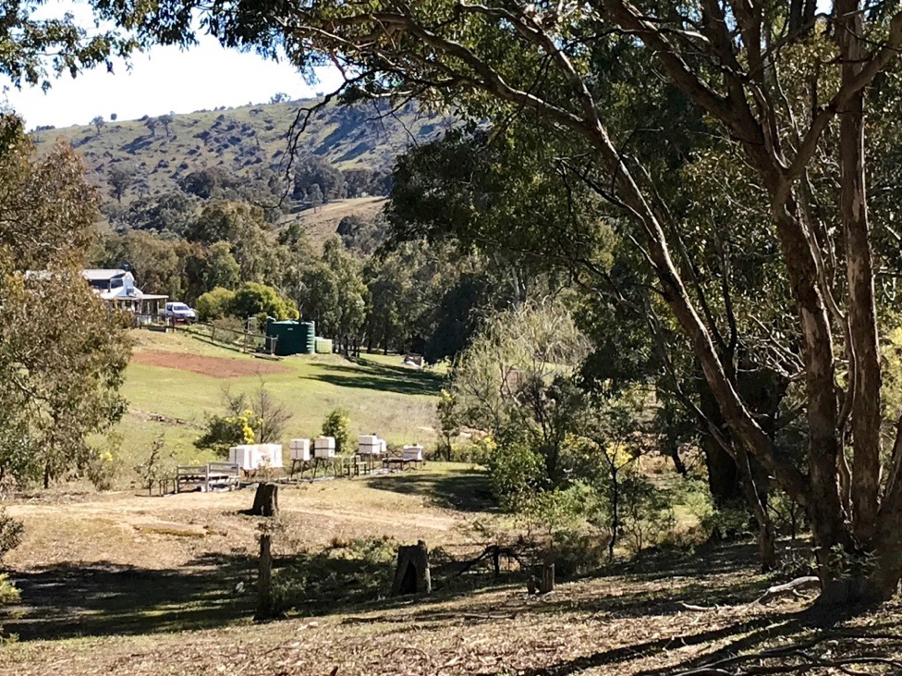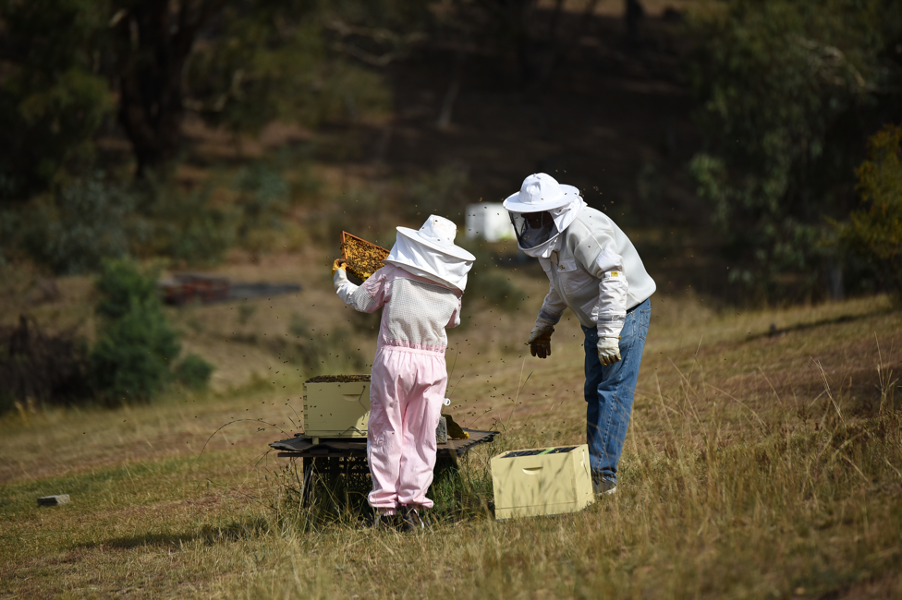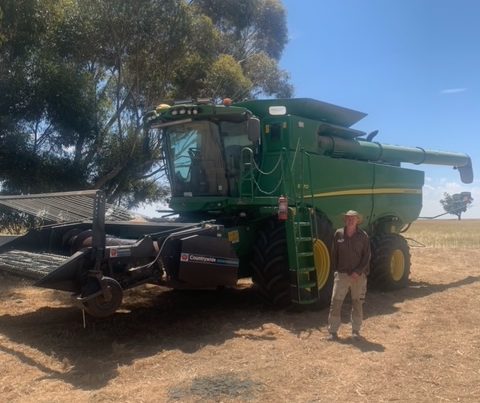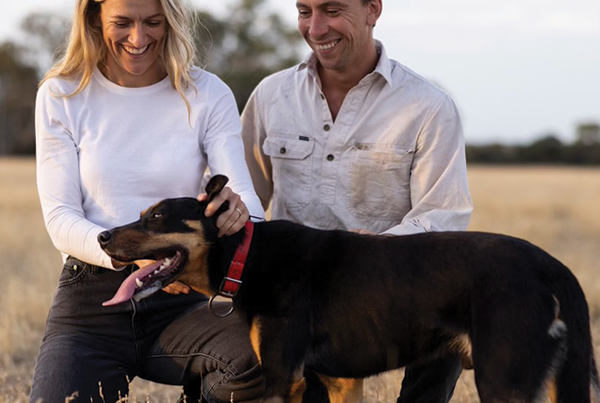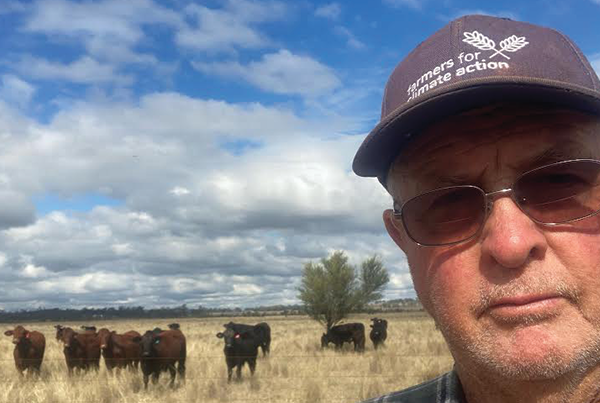At a glance
Who: Kerry and Fernando Caligiore
What: Calenny Orchard, a small 20-acre piece of land
Where: Crooked Corner, located in the Upper Lachlan Shire on the Southern Tablelands of NSW. We are approximately 90 kms from Goulburn and 620 metres above sea level, giving Calenny the cold winters required for the fruit that we grow.
Can you tell us about your property?
We are solo farmers and a mixed farming business. Australian garlic has been our main focus for the past 5 years, we have a well established small fruit orchard of approximately 50 trees that we planted 17 years ago. The orchard consists of apples (Pink Ladies, Golden Delicious, Royal Gala, Granny Smith), pears (William, Packham, Josephine), cherries, Genoa fig trees, almond and raspberries. In addition, we grow small amounts of seasonal vegetables.
We also have a small apiary of 20 hives, helping to pollinate our fruit and helping to keep our pollinator numbers as high as possible given our location and distance from other farming activities. The past few years we have worked on increasing native flora and other bee loving flora to help to slow down and hopefully reduce soil erosion.
We planted over 3000 sunflowers last season that were meant to be sold to the florist, but we quickly realised that our bees needed them more. This is a practice we will continue.
Our key management strategies include hand management so not to overburden the soil, chemical free approaches to growing food and treating our environment respectfully. This greatly increases the amount of physical labour required.
Our rainfall has been steadily falling over the past 3 years. Last year we had 505mm of rainfall with the first quarter of 2020 collecting less. August 2020 rainfall has now exceeded August 2019 rainfall by 200mm, with the longer term forecast looking promising. We have experienced a much warmer winter in 2020 and this will pose problems for our fruit orchard.
What first got you thinking about climate change?
We’ve witnessed a long list of events and observations lead to our realisation that the climate was changing:
- The increasing erratic weather patterns
- The lack of four seasons
- Watching the destruction of the land
- The soil erosion that is occurring at rapid speed on our own land
- The lack of rainfall and the impact on the environment as well as the impact on the native wildlife
- The longer summers in our locality means the soil warms up far more quickly impacting on our garlic crop
How has climate change impacted on your farm business?
The lack of sufficient rainfall means we have needed to water our crops, something that we really didn’t need to do before. Less rainfall has impacted on the eucalyptus flowering posing a huge threat to the survival of our pollinators. The heat filled relentless winds that plagued our region this last season were the biggest impact. No amount of watering had any benefit. The hot winds engulfed any moisture. We lost our cherry crop to the hot winds burning the cherries. Our fruit yield was approximately one fifth of other seasons. A massive loss. We lost our 800kg garlic crop to the very dry winter of 2019, the warmer than usual heat in spring 2019, warming the soil so quickly that the garlic was unable to grow. The drought and fire conditions changed all things Calenny this season. Our bees struggled unable to feed due to dense smoke that affected the bees ability to navigate when there were gums flowering. This was the most devastating, with the loss of eight strong hives. The weather conditions stressed the colonies so much that they were more susceptible to pests and disease. We have been feeding the colonies for the past 2 months in preparation for being packed down for winter. This means weekly feeds of approximately 100 + kgs of sugar, many kilos of pollen, a financial drain when our farm income was already heavily reduced by the weather conditions.
What are some of the climate-smart strategies you’ve been employing and how successful have they been?
Our philosophy is one of educating people in eating seasonally, eating for health and reducing our carbon footprint. We are always working towards zero waste. One example is using all fruit we produce, if not for sale, then by dehydrating, we make fruit vinegars from the peels and cores when dehydrating, all other grown food waste is pumped back into our compost heap to help feed our crops and used when planting flora.
We decided to diversify our business. We simply could not put ourselves at further risk, particularly given our ages and with a government that has been slow to increase its efforts in managing global warming in Australia. We started to use everything that we could get our hands on at Calenny. Beeswax was something that was fairly accessible so this is the path we started in 2019. Focusing on reducing not only our own carbon footprint but others who also wanted to get on the bus. We make beeswax wraps, using a sustainable approach, bee products that are chemical free such as honey lip balm, beeswax lotion bars, beard balms, solid perfumes. Any bee product that is chemical free. We hunted out a market place in Sydney where we thought these products would be warmly accepted by the demographic. Thankfully it paid off. We sold out of our beeswax wraps, lip balms and lotion bars.
We established an online presence with a website and used social media as our voice. We did not just plug our products, we plug the importance of bees. Going forward we want a sustainable community. We are looking for ways to work with clients using the NDIS, training and offering education in beekeeping, chemical free approaches to farming and making chemical free bee products using a lessening carbon footprint philosophy. No more plastic wrap, recycling, using sustainable packaging that is environmentally responsible, in hope that customers will return our glass jars that we supply our honey in using a cash incentive of a discount on the next purchase. We have much more research to do to further support our vision.
